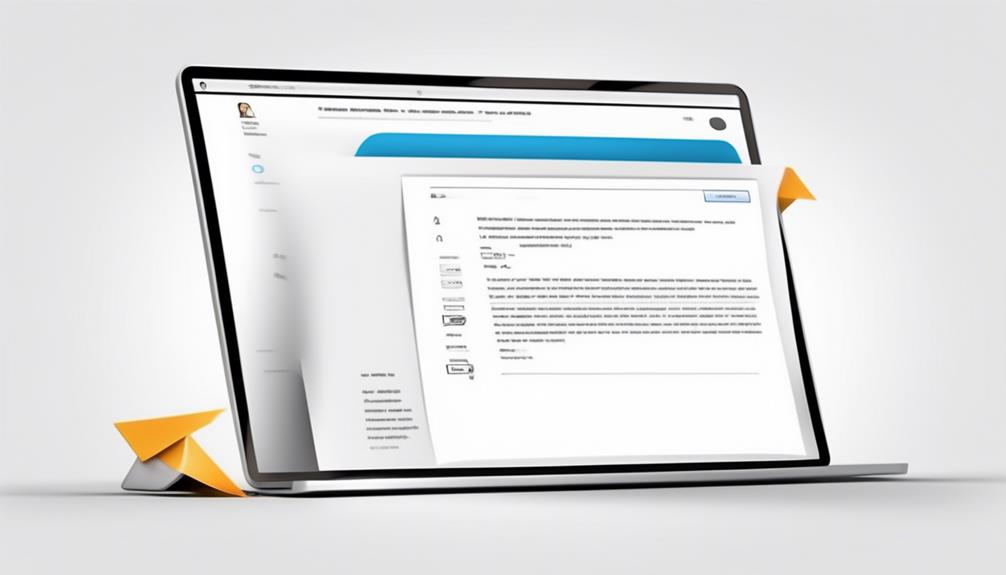We’ve all experienced it – putting in effort on a school project, feeling good about our work, and then getting a grade that disappoints us. The key question is, how should we effectively communicate with our professor about this?
How can we express our concerns without coming off as confrontational or disrespectful? Well, there are some key strategies that can help navigate this delicate situation and potentially lead to a positive outcome.
Let’s explore the important elements of crafting a professional and effective email to address grade-related concerns with a professor.
Key Takeaways
- Use specific keywords related to the grade inquiry in the email subject line.
- Begin the email with an appropriate and respectful salutation, addressing the professor by their correct name.
- Clearly state the purpose of the email and the specific grade in question, providing necessary assignment or exam details.
- Be direct and concise in expressing concerns about the grade, avoiding unnecessary information and maintaining a formal and respectful tone throughout.
Crafting the Email Subject Line
Crafting a clear and concise subject line is crucial when composing an email to a professor about grades. The subject line serves as the first impression, and it should clearly convey the purpose of the email. Using specific keywords related to the grade inquiry, such as ‘Grade Review Request for [Course Name],’ helps the professor understand the email’s purpose at a glance.
A well-crafted subject line increases the likelihood of the email being opened and acted upon promptly, as it helps the professor recognize the email’s importance and urgency amidst the influx of messages they receive.
In crafting the subject line, it’s essential to adhere to email etiquette and maintain a professional tone. The subject line should reflect the specific grade concern or inquiry, making it easier for the professor to understand the nature of the email without ambiguity. Additionally, including keywords related to the grade inquiry ensures that the email is categorized and prioritized accordingly by the professor.
Structuring the Salutation and Greeting

As we address the importance of structuring a respectful and professional salutation and greeting in an email to a professor, it is crucial to begin with an appropriate and respectful opening, such as ‘Dear Professor [Last Name].’ This sets the tone for the rest of the email and shows the professor that you are approaching them with the necessary respect. It is important to double-check the professor’s name before sending the email to ensure accuracy and maintain professionalism. Including your name and the class being attended in the introduction can help the professor identify you and respond more efficiently. Following the greeting with a comma is essential to maintain a formal tone and show respect. Here is an example of a well-structured salutation and greeting:
| Salutation | Example |
|---|---|
| Greeting | Dear Professor [Last Name], |
| Introduction | My name is [Your Name] and I am enrolled in your [Class Name]. |
| Inquiry | I am writing to inquire about my recent grade on [Assignment/Exam Name]. |
Ensuring that the salutation and greeting set a respectful and professional tone for the email is paramount to making a positive impression on the professor.
Providing Background Information
After acknowledging the significance of a respectful salutation and greeting in an email to a professor, we can now focus on providing essential background information to effectively address concerns about grades.
When writing an email to a professor, it’s crucial to find a balance between being concise and providing all necessary details. In order to effectively communicate your concerns about a grade, it’s important to include the following background information:
- Specify the purpose of the email and the grade in question.
- Clearly state the assignment or exam details, including the date, type, and relevant instructions or grading criteria.
- Offer any contextual information or circumstances that may have influenced your performance, such as personal situations, health issues, or family emergencies.
- Highlight your dedication to the class by mentioning past achievements, participation, and efforts to seek extra help or improvement opportunities.
In addition, it’s important to send the email using the professor’s preferred name and email address. When asking a question about your grade, be sure to be respectful and formal. You can also inquire about available office hours or extra credit opportunities to improve your grade.
Clearly Stating Your Purpose

To effectively communicate your concerns about a grade, clearly stating your purpose at the outset of the email is essential. When writing to a professor about grades, it’s crucial to be direct and concise in expressing your concerns. Avoid including unnecessary information that doesn’t relate to your purpose, as it can detract from the clarity of your message. By clearly outlining what you are requesting or proposing in relation to the grade, you demonstrate respect for the professor’s time and attention. Using a formal and respectful tone throughout the email is also important, as it shows your professionalism and seriousness about the matter.
To further illustrate the importance of clearly stating your purpose in an email to a professor about grades, consider the following table:
| Do’s | Don’ts |
|---|---|
| Clearly state the purpose at the outset of the email | Including irrelevant information |
| Be direct and concise in expressing your concern about the grade | Using vague language |
| Clearly outline what you are requesting or proposing | Making demands without proper explanation |
| Use a formal and respectful tone throughout the email | Being disrespectful or confrontational |
| Proofread the email for clarity and precision | Sending an email with typos or grammatical errors |
Concluding With a Professional Signature
When addressing concerns about grades in an email to a professor, ensuring a professional conclusion with a well-crafted signature is pivotal for leaving a lasting impression.
In the context of emailing a professor about grades, the way you conclude your message can be just as important as the content itself. Here are some key points to consider when concluding your email with a professional signature:
- Include Your Full Name and Academic Title: Make sure to include your full name and academic title, if applicable, to convey professionalism and respect.
- Example: John Doe, Major in Economics
- Use a Professional Closing: End your email with a professional closing, such as ‘Sincerely’ or ‘Best regards,’ to maintain a formal and respectful tone.
Frequently Asked Questions
How Do You Email a Professor About a Grade Example?
We generally approach emailing professors about grades with respect and professionalism.
It’s important to clearly and politely express our concerns and provide specific details about the assignment or exam in question.
We also aim to request a meeting to discuss the grade in person if possible.
It’s essential to maintain a respectful tone and avoid being confrontational in order to foster a positive and constructive dialogue.
How Do I Politely Ask a Professor for Grade Adjustment?
We politely ask a professor for a grade adjustment by respectfully expressing our concern and providing specific examples to support our request.
We clearly state our purpose and the grade in question, showcasing our dedication to the class and past achievements.
We remain patient and polite in our follow-ups, understanding that professors may need time to address our concerns.
This approach demonstrates our commitment to improvement and our respect for the professor’s time.
How Do You Write an Email for a Failing Grade?
When facing a failing grade, we must craft an email with utmost care and precision. It’s essential to present our concerns respectfully and clearly, providing specific details to support our request for a grade change. We should offer potential solutions or improvement strategies and adhere to proper email etiquette.
Addressing the professor respectfully, outlining necessary information, and using a clear subject line are crucial elements in composing a compelling email about a failing grade.
How Do You Email a Professor About Grade Error?
We email the professor about a grade error by clearly stating the specific grade in question and providing details about the assignment or exam.
We respectfully and politely communicate our concerns and offer constructive suggestions for addressing the discrepancy.
It’s important to use our academic email address for professional correspondence and maintain a professional tone throughout the email.
We aim to be clear and concise in our communication, while also expressing our willingness to resolve the issue.
Conclusion
In conclusion, when reaching out to a professor about grades, it’s crucial to be respectful and professional. Remember to clearly state your purpose, offer solutions, and follow proper email etiquette.
It’s important to be patient and understanding while waiting for a response. And always remember, Rome wasn’t built in a day, so be persistent in your pursuit of academic success.









